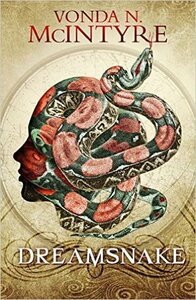Take a photo of a barcode or cover
On the whole, Dreamsnake just didn't grab me. Part of it is personal bias; I'm not generally a fan of post-apocalyptic, "survival-in-the-ruins-of-the-earth" fiction. Beyond that, however, there were a number of other problems I had with the book.
For one thing, the first two chapters are so relentlessly depressing that it's almost funny. ("A Series of Unfortunate Events: The Miserable Medic", perhaps?) It does get better from there, but I doubt that I would have continued reading if this hadn't been a selection of our book club.
For another thing, I found elements of human society & character behavior in the story to be unrealistic. Everyone is so concerned about everyone else's feelings. We see people acting pridefully, or out of fear, but we almost never see cruelty or rage. We never see anyone living in a community who is poor, or hungry. Sexual violence is so unheard of that there isn't even a name for it. I can suspend my disbelief pretty far, but I can't quite buy it. I found myself hoping that it would turn out that the main character was an unreliable narrator, or that the people living in this world were actually enlightened, genetically engineered post-humans. No such luck. It's clear that the author wants to believe that these utopian societies are possible. It's a beautiful dream, but makes for lousy storytelling.
That's not to say that this was a bad book. I did quite like the main character, who was a strong, capable, and believable female protagonist. The book became more predictable near the end, but it kept me guessing in the middle, which I highly appreciate. And while the themes of nuclear war and genetic manipulation are rather tired for a modern audience, it does present a fascinating snapshot of the era in which it was written.
For one thing, the first two chapters are so relentlessly depressing that it's almost funny. ("A Series of Unfortunate Events: The Miserable Medic", perhaps?) It does get better from there, but I doubt that I would have continued reading if this hadn't been a selection of our book club.
For another thing, I found elements of human society & character behavior in the story to be unrealistic. Everyone is so concerned about everyone else's feelings. We see people acting pridefully, or out of fear, but we almost never see cruelty or rage. We never see anyone living in a community who is poor, or hungry. Sexual violence is so unheard of that there isn't even a name for it. I can suspend my disbelief pretty far, but I can't quite buy it. I found myself hoping that it would turn out that the main character was an unreliable narrator, or that the people living in this world were actually enlightened, genetically engineered post-humans. No such luck. It's clear that the author wants to believe that these utopian societies are possible. It's a beautiful dream, but makes for lousy storytelling.
That's not to say that this was a bad book. I did quite like the main character, who was a strong, capable, and believable female protagonist. The book became more predictable near the end, but it kept me guessing in the middle, which I highly appreciate. And while the themes of nuclear war and genetic manipulation are rather tired for a modern audience, it does present a fascinating snapshot of the era in which it was written.
adventurous
challenging
sad
medium-paced
Plot or Character Driven:
Plot
Strong character development:
Yes
Loveable characters:
Yes
Diverse cast of characters:
No
Flaws of characters a main focus:
No
Hey, I love snakes, so a book in which snakes are featured prominently works for me :) Nice to read books with strong female protagonists. Found the storytelling to be a bit simple at times, and endings a bit too convenient. But it's entertaining and good.
challenging
hopeful
mysterious
slow-paced
Plot or Character Driven:
Character
Strong character development:
Complicated
Loveable characters:
Yes
Diverse cast of characters:
Yes
Flaws of characters a main focus:
No
I loved it when I first read it and, despite having forgotten everything except the first chapter, I loved it again on audio reread.
Es un gran libro, pero el final me dejó algo insatisfecha.
Edit: No, esperen, pensándolo bien es un gran final. Lo que me deja insatisfecha es la innecesidad de cierto personaje más allá de su papel inicial.
Edit: No, esperen, pensándolo bien es un gran final. Lo que me deja insatisfecha es la innecesidad de cierto personaje más allá de su papel inicial.
Spoiler
Arevin
Engaging story in a pretty interesting setting. I liked the characters quite a bit, and while the story was enjoyable enough it didn't flow very well. This is my favorite kind of post-apocalyptic story: the destructive event was so long ago no one really remembers it, and humans have adapted to a new situation and have functioning societies. I find that infinitely more interesting than "what would modern people do if society collapsed?"
Overall a very creative, unique look at the future the I enjoyed.
Overall a very creative, unique look at the future the I enjoyed.
I'm not sure why this book didn't work for me but it didn't. I like strong female characters (check), interesting post-apocalypse settings (check) and unique mechanics (healing through tailored snake venom) but it never came together for me. One possibility was the unending series of bad things that happened to the main character. It was surprising at first but quickly my feelings changed to depression as yet more bad things happened.
I did like the concepts underlying the main story - gene manipulation, alien tech, enclaves, etc. - and a few of the story characters.
I did like the concepts underlying the main story - gene manipulation, alien tech, enclaves, etc. - and a few of the story characters.
adventurous
emotional
tense
medium-paced
Plot or Character Driven:
A mix
Strong character development:
Yes
Loveable characters:
Yes
Diverse cast of characters:
Yes
Flaws of characters a main focus:
Yes
One of the blurbs on the back from Frank Herbert describes this book as "readable", and it is just about that, in the sense that Keystone Light is "drinkable" or Taco Bell "edible." Treacly characters, flopsy world-building, and shoddy writing combine for a book that is just embarrassing. What do I mean?
In a post-apocalyptic Earth, ravaged by nuclear war and contact with aliens, Snake is a Healer who used advanced biotechnology in the form of altered snake venom to cure disease. The dreamsnake is a strange alien creature, with a mind-altering bite that brings painless death to those who cannot be cured. Crude and superstitious herders kill Snake's precious dreamsnake, and so she wanders around the wasteland helping out people and trying to find another dreamsnake. Snake is really just the best. She cares about everybody: Snake does what she can for an prospector with a broken back, teaches a nervous young man about love, saves a dying lord, rescues a child from a sexually abusive guardian, fulfills a dying wish, helps an addict, and breaks up a cult that is abusing the powers of the dreamsnake, before finding Tru Wuv. She rides a fancy racehorse when she's not riding the tiger-striped pony she genetically engineered. But Snake's not perfect: she just cares so much it makes her tired and lonely; but she'd never abuse her healing powers in the wasteland for personal benefit; and sometimes she hurts from arthritis brought on by her snake-venom-juiced immune system.
The wasteland is the nicest post-apocalypse I've seen, with honest tribes of nomads, peaceful and prosperous cities, and the right craftsman when you need one. The only hints of conflict or desperation come from Central City, the sole humans who trade with aliens who are divided into paranoid clans. Of course, Snake doesn't actually go into Central City, or interact with them beyond the gatekeeper, because conflict isn't interesting or something. By the way, accidental pregnancy (and related drama) is avoided through "biocontrol" techniques that are explained in detail during awkward sex scenes. The atomic apocalypse, the aliens, the hints of more advanced technologies and hidden schools of esoteric knowledge, seem to be cargo culted from the genre at large rather than included for any actual reason. The seemingly benevolent Healers, like Snake, limit their numbers to the scarce dreamsnakes, rather than using their "mundane" techniques like tumor-melting vipers and vaccine-producing rattlesnakes, to serve as many people as possible. Some humanitarians!
As for the writing, it is overall juvenile, and in places cringe-worthy. And even though the language is simple, it's unclear in critical descriptions of action and physicality. I found myself flipping back a page to check where people were relative to each other, and who had been shot with a crossbow, multiple times. A few nice descriptions of deserts can't save this. The idea of the dreamsnake is woefully underused. We're told Snake needs one to be a healer, but she gets on perfectly well saving lives without one for the entire novel. Compared to other Hugo stinkers, Fritz Lieber at least writes with energy, and the ponderous psuedo-intellectualism of "yeast vat accident Mark Clifton’s They’d Rather Be Right" (props to Scott Lynch) fit the scope of the topics. Dreamsnake can't even live up to it's meager ambitions.
On an interesting historical note, 4 of the 5 Hugo nominees this year were women, with Vonda McIntyre, Ann McCaffrey, C.J. Cherryh, and a withdrawn entry from James Tiptree Jr. Both McCaffrey and Cherryh submitted the third book in a trilogy, which may have hurt their chances in the voting. Neither are my favorite authors, but they have to be better than this book.
In a post-apocalyptic Earth, ravaged by nuclear war and contact with aliens, Snake is a Healer who used advanced biotechnology in the form of altered snake venom to cure disease. The dreamsnake is a strange alien creature, with a mind-altering bite that brings painless death to those who cannot be cured. Crude and superstitious herders kill Snake's precious dreamsnake, and so she wanders around the wasteland helping out people and trying to find another dreamsnake. Snake is really just the best. She cares about everybody: Snake does what she can for an prospector with a broken back, teaches a nervous young man about love, saves a dying lord, rescues a child from a sexually abusive guardian, fulfills a dying wish, helps an addict, and breaks up a cult that is abusing the powers of the dreamsnake, before finding Tru Wuv. She rides a fancy racehorse when she's not riding the tiger-striped pony she genetically engineered. But Snake's not perfect: she just cares so much it makes her tired and lonely; but she'd never abuse her healing powers in the wasteland for personal benefit; and sometimes she hurts from arthritis brought on by her snake-venom-juiced immune system.
The wasteland is the nicest post-apocalypse I've seen, with honest tribes of nomads, peaceful and prosperous cities, and the right craftsman when you need one. The only hints of conflict or desperation come from Central City, the sole humans who trade with aliens who are divided into paranoid clans. Of course, Snake doesn't actually go into Central City, or interact with them beyond the gatekeeper, because conflict isn't interesting or something. By the way, accidental pregnancy (and related drama) is avoided through "biocontrol" techniques that are explained in detail during awkward sex scenes. The atomic apocalypse, the aliens, the hints of more advanced technologies and hidden schools of esoteric knowledge, seem to be cargo culted from the genre at large rather than included for any actual reason. The seemingly benevolent Healers, like Snake, limit their numbers to the scarce dreamsnakes, rather than using their "mundane" techniques like tumor-melting vipers and vaccine-producing rattlesnakes, to serve as many people as possible. Some humanitarians!
As for the writing, it is overall juvenile, and in places cringe-worthy. And even though the language is simple, it's unclear in critical descriptions of action and physicality. I found myself flipping back a page to check where people were relative to each other, and who had been shot with a crossbow, multiple times. A few nice descriptions of deserts can't save this. The idea of the dreamsnake is woefully underused. We're told Snake needs one to be a healer, but she gets on perfectly well saving lives without one for the entire novel. Compared to other Hugo stinkers, Fritz Lieber at least writes with energy, and the ponderous psuedo-intellectualism of "yeast vat accident Mark Clifton’s They’d Rather Be Right" (props to Scott Lynch) fit the scope of the topics. Dreamsnake can't even live up to it's meager ambitions.
On an interesting historical note, 4 of the 5 Hugo nominees this year were women, with Vonda McIntyre, Ann McCaffrey, C.J. Cherryh, and a withdrawn entry from James Tiptree Jr. Both McCaffrey and Cherryh submitted the third book in a trilogy, which may have hurt their chances in the voting. Neither are my favorite authors, but they have to be better than this book.







